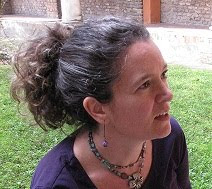My aunt was an organ donor
and so, the day she died,
her organs were harvested
for medical science.
I suppose there must be people
who list, under "Occupation,"
"Organ Harvester," people for whom
it is always harvest season,
each death bringing its bounty.
They spend their days
loading wagonloads of kidneys,
whole cornucopias of corneas,
burlap sacks groaning with hearts and lungs
and the pale green sprouts of gall bladders,
and even, from time to time,
the weighty cauliflower of a brain.
And perhaps today,
as I sit in this café, watching the snow
and thinking about my aunt,
a young medical student somewhere
is moving through the white museum
of her brain, making his way slowly
from one great room to the next.
Here is the gallery of her girlhood,
with that great canvas depicting her father
holding her on his lap in the backyard
of their bungalow in St. Louis.
And here is a sketch of her
the summer after her mother died,
walking down a street in Berlin
when the broken city was itself
a museum. And here
is a small, vivid oil of the two of us
sitting in a café in London
arguing over the work of Constable
or Turner, or Francis Bacon
after a visit to the Tate.
I want you to know, as you sit there
with your microscope and your slides,
there's no need to be reverent before these images.
That's the last thing she would have wanted.
But do be respectful. Speak quietly.
No flash photography. Tell your friends
you saw something beautiful.
This poem has fabulous construction. At the end it reminds me of the Lovesong of J. Alfred Prufrock, "in the rooms the women come and go, speaking of Michelangelo." That of course sends me instantly to the Isabella Stewart Gardner Museum where I spent many, many happy hours as a teen. Perhaps that is a distant connection? The rooms at the Gardner seem especially constructed for the deceitfully light chatter of ladies who lunch. I wonder at the poets who write these lines. Did they too spend impressionable hours in quiet houses peopled with oils and marble?


No comments:
Post a Comment